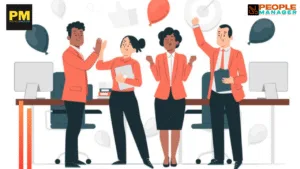Two-thirds of Gen Z believe ‘job-hopping’ is vital for their career growth: FDM Survey
The findings were reported in FDM Group's Gen Z: Breaking Generational Stereotypes whitepaper, in which the FTSE firm questioned 236 consultants divided into Gen Z and non-Gen Z, with 1997 serving as the cut-off. Gen Z presently accounts for 30% of the world's population and is predicted to increase to 27% of the global workforce by 2025.

In the dynamic landscape of career development, Gen Z is rewriting the rules. A recent study by FDM Group reveals that two-thirds (66 percent) of Gen Z believe that changing companies is the key to unlocking their career potential. Gone are the days of blind loyalty; this generation prioritizes skills acquisition and fresh experiences over traditional job stability.
The findings were reported in FDM Group’s Gen Z: Breaking Generational Stereotypes whitepaper, in which the FTSE firm questioned 236 consultants divided into Gen Z and non-Gen Z, with 1997 serving as the cut-off. Gen Z presently accounts for 30% of the world’s population and is predicted to increase to 27% of the global workforce by 2025.
Developing skills, particularly digital abilities, was identified as a primary driver of job-hopping, with 80% of Gen Z stating that they would return to the office for coaching, collaboration, mentoring,, and learning from others. Two-thirds of Gen Z reported unhappiness with the available learning tools, compared to 56% of non-Gen Z.
The potential to learn from and shadow others, particularly when senior leadership is present, was cited as the primary incentive for employees wanting to come into the office.
Despite this, three-quarters of Gen Z and Millennials who presently work for remote or hybrid organizations indicated they would quit right away if their employers required in-person, full-time work.
“Gen Z’s perspective is critical in understanding how technology fits into our lives, and they play an incredibly important role in any business,” stated Sheila Flavell CBE, COO of FDM Group. “Many businesses are limited by outdated thinking and legacy technologies, but Generation Z holds the key to disrupting the existing quo and changing how we work. Businesses can tap into this pool of talent to create multigenerational workforces that leverage the skills of each group to generate success.”
Overall, 95% agree that ‘challenging traditional thinking’ is the most important attribute that Gen Z can bring to organizations, shaking up traditional procedures and bringing new ideas to the workplace. Adaptability, communication, teamwork, and problem-solving were also frequently mentioned.
When developing multigenerational workforces with Gen Z, FDM Group recommends fostering an adaptive work culture based on feedback to meet changing employee expectations; improving the clarity and accessibility of learning and development to allow employees to better themselves; and reimagining employee loyalty by prioritizing employee advocacy over retention.
Kate Hawthorn, Director of Consultant Talent at FDM Group, commented: “A multigenerational workforce has been a reality since 2023, with representation from all five generations.” Gen Z is the fastest growing age group, and their contributions can help bridge the skills gap, therefore, it is critical to understand their approach to work. As a talent pool, they prioritize flexibility, meaningful work, and real connection above all else, and organizations must be adaptable and embrace a new approach to training and upskilling to enhance retention and establish a vibrant workforce.”
The Survey findings:
Why the Shift?
Cost-of-Living Crisis: Gen Z faces economic realities, and they recognize that switching jobs can lead to better financial prospects. Climbing the career ladder and boosting salaries are top priorities.
Stepping Stones, Not Stagnation: Unlike their predecessors, Gen Z views each role as a stepping stone. They seek growth, not stagnation.
Skills Development: The Driving Force
Digital Skills: Gen Z understands that staying relevant means mastering digital skills. They value learning opportunities and are willing to go into the office for coaching, collaboration, and mentoring.
Learning Dissatisfaction: However, they express dissatisfaction with available learning resources, highlighting the need for improvement.
The Office as a Learning Hub
Learning from Others: Gen Z believes in learning from senior leaders. The office provides a space for shadowing and mentorship.
Remote Work Dilemma: Despite this, a significant number would quit if forced into full-time, in-person work. Flexibility matters.
Gen Z’s Impact on Workplaces
Challenging Tradition: Gen Z brings fresh perspectives. They challenge the status quo, infusing teams with new ideas and approaches.
Adaptability and Communication: Their strengths lie in adaptability, communication, teamwork, and problem-solving.
Building Multigenerational Workforces
Embrace the Talent: Businesses should tap into Gen Z’s potential. They hold the key to redefining work norms.
Feedback-Driven Culture: An adaptive work culture, fueled by feedback, meets evolving employee expectations.
Learning Clarity: Prioritize accessible learning and development opportunities to empower staff.
Employee Advocacy: Shift from retention-focused loyalty to employee advocacy.
In this multigenerational workforce, Gen Z’s approach—flexibility, meaningful work, and authentic communication—can bridge the skills gap. Let’s adapt, upskill, and thrive together.
The full study can be found at: https://www.fdmgroup.com/genz/
Stay tuned, to PropleManager.co.in for further updates on the evolving workplace paradigm.
Value our content… contribute towards our growth. Even a small contribution per month would be of great help to us. Since our establishment, we have been serving the industry through daily news and updates.
Our content is free for all, and we plan to keep it that way
Support the People Manager. Pay Here







